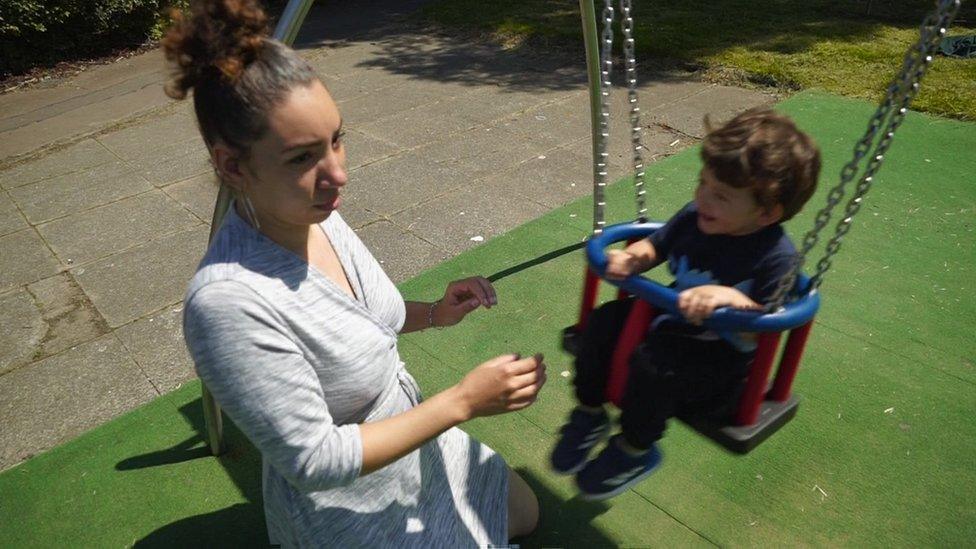Universal credit: Fraud victims may still have to pay money claimed
- Published
Jade Thomas was left hundreds of pounds out of pocket by a universal credit fraudster
Victims of a Universal Credit scam may still have to repay money fraudulently claimed on their behalf, the government has insisted.
Work and Pensions minister Justin Tomlinson had told MPs his team would "protect vulnerable people" who would not be expected to pay back the cash.
But later his department said its position had not changed and claimants would need to repay some of the money.
The SNP's welfare spokesman described it as an "absolute disgrace".
A BBC investigation has found tens of millions of pounds is believed to have been stolen by criminals exploiting a loophole in the benefits system.
An estimated 42,000 people may have fallen victim to the scam.
Responding to an urgent question in the Commons on Wednesday, Mr Tomlinson claimed that "where it is clear that they have been a victim of fraud through no fault of their own, no, we would not expect them to pay it back."
But a spokeswoman from the Department for Work and Pensions later told the BBC that victims of the scam would have to repay any money they'd kept.
"If someone's details are fraudulently used to claim an advance but they do not themselves receive this payment, we will not recover the money from the claimant," she said.
"[But] if the individual receives some of the advance, we will only seek to recover this amount from them and will pursue the fraudster for any remaining payment."
The SNP's Neil Gray MP tweeted: "When ministers and the DWP know these people have been ripped off by criminals without their knowledge as they hoped to access hardship funds they desperately need to survive, UK Gov will now plunge them further into debt and destitution. Disgusting."
Mr Tomlinson described the fraudsters as "parasites targeting some of the most vulnerable people in society".
The frauds represented about 1% of the total 4.4 million claims and are being investigated, he added.
A team of about 120 Department for Work and Pensions staff were working to spot and investigate fraudulent claims, he said.
Mr Tomlinson promised "the full force of the law" would be used where appropriate.
He also told MPs that those whose claims for universal credit were found to be fraudulent may be able to return to their old benefits.

The scam pushed Jade Thomas into rent and council tax arrears
Earlier, Jade Thomas, 31, had told the BBC how she ended up owing more than £1,500 after a loan was arranged for her by a fraudster.
After the DWP paid over the money into her bank account, she had to pay the fraudster £1,000 for setting it up - but was still liable for the full £1,500 amount.
One official said more than a third of claims in one job centre are currently suspected of being bogus, while £100,000 of fraudulent activity each month was recorded at another branch.
Another official said the government estimates 10% of the 100,000 or more advances paid monthly are potentially bogus.
More than 1.5 million people across Britain currently receive benefits through universal credit.
When it was introduced in 2013, one of the original goals of universal credit was to save about a billion pounds in fraud and error.
- Published8 July 2019
